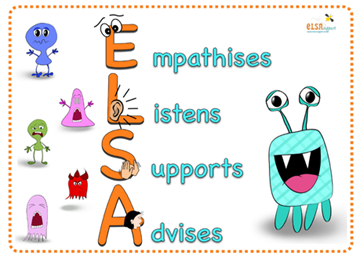Emotional Health and Well-being
Queenswood takes children’s emotional health and wellbeing very seriously, and believes that only well children have strong mental health, will they truly meet their true potential.
Emotions, well-being, physical and mental health are all covered in our PSHE curriculum and through our school values are exemplified and discussed in everything that we do.
Staff at Queenswood recognise early signs of challenges to mental well being in our children, and have clear structures in place to intervene and support.


What is ELSA?
There will always be children and young people in schools facing life challenges that detract from their ability to engage with learning. Some will require greater support to increase their emotional literacy than others. ELSA is an initiative developed and supported by Educational Psychologists. It recognises that children learn better and are happier in school if their emotional needs are also addressed.
Miss Vincent has been trained by Educational Psychologists to plan and deliver programmes of support to pupils who are experiencing temporary or longer term additional emotional needs. The ELSA work is delivered on an individual basis and in small groups, and juice and biscuits are always available for that extra comfort!
Sessions are fun and positive, we use a range of activities such as: games, role-play, drawing and circle time. ELSA sessions take place in our very own ELSA room situated in the bungalow on site, which provides a calm, safe space for the child to feel supported and nurtured.
In ELSA we aim to provide support for a wide range of emotional needs:
- Recognising emotions
- Self-esteem
- Social skills
- Expressing feelings
- Friendship skills
- Anger management
- Loss and Bereavement
- Coping skills and strategies
- Anxiety and Worries
How does ELSA work?
Children are usually referred for ELSA support by their class teacher, Senior Leaders or SENDCo. The ELSA assistant will plan and support pupils in developing new skills and coping strategies. These allow them to manage social and emotional demands more effectively. They carry out follow up sessions with the child to see how their emotional well-being is.
Supporting – not fixing
Remember, ELSAs are not there to fix children’s problems. What we can do is provide emotional support. We aim to establish a warm, respectful relationship with a pupil and provide a reflective space where they are able to share honestly their thoughts and feelings.
It needs to be appreciated that change cannot necessarily be achieved rapidly and is dependent upon he context and complexity of the presenting issues. For children with complex or long-term needs it is unrealistic to expect ELSA intervention to resolve all their difficulties, however support will be designed to target specific aspects of a child’s need. Training and development of ELSAs is an ongoing process and wisdom is required to recognise when issues are beyond the level of expertise that could reasonable be expected of an ELSA. The Educational Psychologist that works with our school would be able to offer advice on suitability or nature of ELSA involvement in complex cases.

